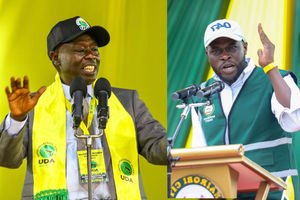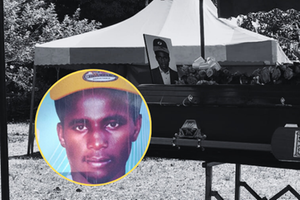Navigating beyond conflicts: Inside Muiu’s 10 years at the helm of women’s body
What you need to know:
- Maendeleo Ya Wanawake has been in existence since 1952, when it was founded by the daughter of a missionary.
- In 2014, it got a new chairperson in Rahab Muiu. However, she had a ‘big struggle’ due to conflicts with other officials. She emerged victorious, and then focused on steering Mywo’s transformation through different projects
After 41 years with Kenya’s oldest women’s organisation, Maendeleo Ya Wanawake Organisation (Mywo), chairperson Rahab Muiu will not be running for re-election and instead plans to retire.
Muiu is one of the historic group’s longest-serving chairs and has led Mywo through several notable instances of organisational in-fighting and court cases, which have made headlines.
She sat down with Nation.Africa for an in-depth, one-on-one interview about her tenure, Mywo’s accomplishments under her leadership and what’s next for her.
“I am on the finishing line,” says Muiu, seated in the boardroom of Maendeleo House in Nairobi’s central business district – portraits of past chairs adorn the wall behind her: black and white photos, which change to coloured ones, demonstrating the organisation’s long history.
“I would want a very good chair to come and take over and do the work of women.”
Mywo operates nationally across all 47 counties and has a membership of four million, according to its website. It was founded in 1952, during colonial rule, by the daughter of a missionary, and originally focused on women’s domestic duties. The group turned to political advocacy and ‘Africanised’ starting in 1958.
In this office, Maendeleo’s founder is the sole non-African photo, hanging on the wall behind Muiu.
Before the 1990s, Mywo’s leadership changed frequently, with most chairs – aside from notable public figure Jane Kiano – serving for a few years at a time.
Muiu was elected in 2014 and has led the group for 10 years, presiding over the group’s 70th anniversary celebrations, several water projects, a new constitution and strategic plan and a court-ordered forensic audit, but she says the first five years of her term were a “big struggle”.
Before Muiu took charge, the organisation was divided publicly over the lack of Annual General Meetings (AGMs) in previous years. Muiu, then serving as one of Mywo’s national vice chairpersons, says she sided with those “keen” to resume the AGMs, opposing Rukia Subow, then national chairperson.
Subow brought the matter to court, trying to block the AGMs, says Muiu. “We also went to court to say, ‘We just take it as elections.’”
Muiu was elected unopposed, after Subow and another candidate stepped down ahead of the organisation’s 2014 general election. Those who had sided with Subow over the AGM conflict were also elected to executive positions and leadership was divided.
“We started right from two camps,” says Muiu.
"They were determined for me not to succeed."
According to Muiu, those internal divisions impacted the entirety of her 10-year leadership with Mywo.
A campaign promise by Muiu to transfer ownership of Maendeleo’s properties to the organisation’s name, as opposed to individual trustees – thus, allowing the Mywo to more easily financially leverage the property assets – led to public fighting and court battles over rental income. Touching Maendeleo House, says Muiu, was like “a bomb”.
Staffing dispute
Adding to the discord, was a staffing dispute, which resulted in another lawsuit in 2016 – one of the many Mywo was involved in at the time. “I felt that so much time was lost with court cases, which were not necessary,” says Muiu.
“Five years, for me, we could have done much more. We would have finished with this process of transferring the properties to Maendeleo.”
In 2016, a court ordered a forensic audit of Mywo’s finances from 2011 to 2016. The divided organisation couldn’t agree on which auditors to use, causing delays and returning to court, with one side requesting that Muiu be arrested and imprisoned for being in contempt of the 2016 court orders – a judge found the application meritless and dismissed it with costs.
“There is nothing I did not go through. There is no name I have not been called. There's nothing I have not heard. There are no phone calls I have not received,” says Muiu.
She added that she was able to get through the difficult period of political in-fighting, in part, by reminding herself that she came to Mywo to work and that as a business woman, she was used to working hard each day.
Muiu says the forensic audit found nothing improper. Nation.Africa has not independently verified the audit reports.
Mywo was able to transfer the ownership of the 10-storey Maendeleo House in Nairobi to the organisation. And by 2019, it completed an updated constitution, which expanded the number of delegates in the organisation from 470 to 760, to include all sub-county chairs at AGMs.
Muiu says the result is that when Mywo makes a decision, it has talked to the whole country. While more voices are now heard within Mywo at the AGMs, some critics assert that the organisation’s voice has been absent from conversations around the recent youth-led protests, which have rocked Kenya. Muiu disagrees, saying “when you are working, you do not need to talk.”
Water harvesting
Maendeleo, she says, has always worked with the government of the day, and has been prioritising its projects, especially in water harvesting.
“Maendeleo is used to going and having a seat with the Head of State, quietly. Like the photos you have seen in the corridor,” she says, referencing the photos of Mywo members shaking hands and interacting with government players over the decades.
“It is very difficult for us now, the way the country looks, to start talking to the Head of State in forums. There are things you can talk [about] on TV; there are things you talk [about] in private.”
Muiu does, however, believe it is important to listen to young people, engage with them on their own terms. She says that Gen Z cannot be “reduced to voters”.
“We have failed the young people,” she says. “The children's voices are where the story is,” she says, pausing, before adding: “They should also allow us to impute into their thinking.
“This is their building,” she says, gesturing around the boardroom, referencing the property that had been at the centre of multiple organisational conflicts.
“If they want to come and ask me questions, I welcome them here, we’ll put 500 chairs; we’ll talk.”
Partnership
Water has been a priority for Maendeleo under Muiu.
Once the group was finally able to work after the tumultuous first five years, Mywo launched its national water harvesting project, in partnership with Equity Bank in 2019, she says.
The project aims to supply women with 10,000-litre water tanks that allow them to harvest rainwater. More recently, the group began working with Danish company, 4Life Solution, on a reusable jerrycan that purifies water using the sun.
The SaWa Can meets World Health Organisation’s performance criteria.
Muiu says there is a business aspect to the project. The can costs Sh1,000 and is sold by the women Mywo has trained. The women earn Sh200 – something Muiu says she bargained hard for.
The Danish firm that produces the can gets Sh600 and Maendeleo gets Sh200 for posting the can. “It is a win-win for everybody.”
For Muiu, Kenyan women are capable. She points to all the women working in the informal economy selling fruits and vegetables in markets, and how in all areas of life, there is a woman doing business ventures. What is needed, says Muiu, is capital. Even a few shillings can go a long way.
“I just want now to finish,” says Muiu.
“I want this watercan to go everywhere it can go. I want the water tanks to go everywhere they can go and elections to be country-wide.”
In the previous regime, Mywo partnered with the First Lady’s Beyond Zero Initiative, supporting the drive to end maternal deaths and HIV infection during birth by creating awareness countrywide at the grassroots level.
As for Muiu’s plans after Maendeleo, she’s turning her attention to the next generation. “My next campaign, God-willing, will be mentoring.”





